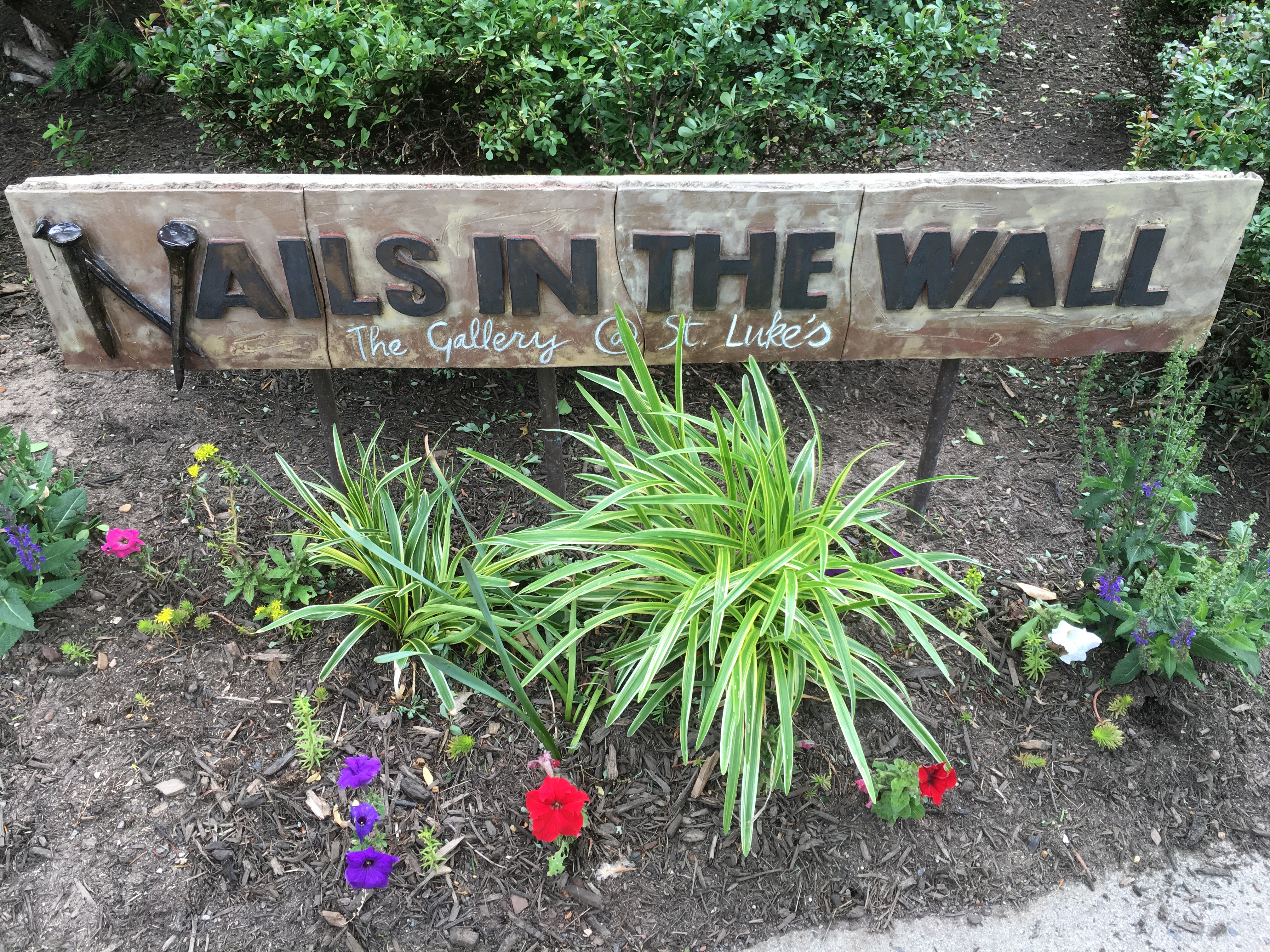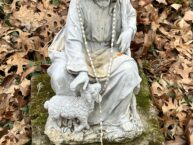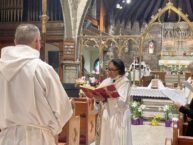 June 12, 2016 – Mass on the Grass…with Brass!: May God’s words alone be spoken, may God’s words alone be heard. Amen.
June 12, 2016 – Mass on the Grass…with Brass!: May God’s words alone be spoken, may God’s words alone be heard. Amen.
I love being out here in the middle of this beautiful park – surrounded by the beauty of God’s creation. I especially am so grateful to hold worship out here, not only because of the beauty, but because of something even more powerful.
The beauty of a church is a wonderful thing – ours is certainly one of the most beautiful I have ever seen. Church provides a sense of the sacred – it doesn’t look like the office, or the house, or a million other places we tend to run back/forth to do things in or at… the building we call the church stands against the pulls of modern time – almost bidding us to slow down, to look, to sense, to feel, to listen.
But… a church building is not where we find God…or I should say, it is not the only place where we find God. And so here we are today, in church, and also the church – experiencing God in creation and in community. It is an unexpected place to find us at this hour on a Sunday, but then again, if we have learned anything from scripture it is that relationship with God is full of the unexpected. Just look at our gospel reading today:
Jesus is invited to a Pharisee’s home for dinner. Likely there are many other guests, and as they are lounging having dinner (remember, there aren’t chairs – sort of like some of you today on your picnic blankets), when this woman comes in, and in a show of overwhelming gratitude and love, cares for the feet of Jesus – washing them with her tears, wiping them with her hair, and annointing them with oil. It all sounds a bit strange, but remember the open sandals everyone wore, and walking was the primary mode of transportation. His feet, and those of his followers would be dry, cracked, sore, and very dirty. Simon, the Pharisee, is not pleased.
In his mind, this is a woman who has broken some measure of societal expectations, norms, or law – and so has been cast aside as a sinner. To Simon, she is unworthy of even entering his house, lest her sinfulness cast a mark on him, and she is creating an absolute spectacle in his home in front of his guests. Only those worthy should be at his table – and darn it all, if this Jesus guy were really all that – really a rabbi, one who understands the faith – well then dang it, he outta know better than to allow this woman to be so close to him in the first place. What kind of prophet could he be anyway if he doesn’t even know who is rightous and who is not!
Jesus responds to Simon, which I imagine surprised him too, since Simon at least had acted as a good host, and not said a word openly about the incident. I am guessing he was wondering “did I say that out loud?” And in a parable about sin & forgiveness, love & grace, Jesus does a little soft smack down of his self-rightous host.
Now, when I hear this gospel, I think about something that happened to a Sunday School teacher after she had just concluded her lesson and wanted to make sure she had made her point. She said, “Can anyone tell me what you must do before you can obtain forgiveness of sin?” There was a short pause and then, from the back of the room, a small boy spoke up. “I know… you gotta sin!” he said. The kid has a point, right?
We get kinda all squiggly in our seats when this whole sin stuff comes up, and I think it is because for so many generations, the church has been full of self-righteous Simons – finger pointers (many from the pulpit) who liked to say that so-and-so were going to hell. I used to think, based on those folks, I’d rather be in hell, ‘cause heaven ain’t all that if all the fun people are excluded.
Now we all should know by now that sin has nothing to do with particular actions, but just about turning away from the love of God and when we do that, we tend to not treat ourselves or our neighbors in a loving way. We deny ourselves the life giving light of love, and it becomes harder to love others, including ourselves, as a result. Redemption is simply turning back towards God, to be filled with that light and love that is always there for us. But Jesus is also talking about forgiveness…and about what it means to be a person of faith, how we are to live that out.
If we really look at what Jesus is talking about here, we will see that clearly. The word in this passage that is translated as forgive, has in the Greek a root meaning of “let go.” Jesus is telling Simon that it takes a lot of energy to hold onto righteous anger, to build walls that divide people, and to rigidly stick to rules. Jesus is asking Simon, and us, to let go.
I am reminded of an old story. There were two monks who were travelling from one monastery to another.. They were from a celibate order, not even allowed a direct gaze at a woman. After a long walk, they came to a river, which they had to cross. There had been a lot or rain lately, and the river was flooded, making it impossible to cross without getting wet, or worse. Standing on the banks was a woman who was distressed about trying to cross, but she needed to get to the other side so that she could reach her dying mother’s home in time. The monks decided to cross by walking through the shallow part of the river. Since the woman also needed to get on the other bank, one of the monks, without much ado, carried her in his arms, and soon they reached the other bank, where he set her down. After thanking him, she went her way and the two monks continued their walk in silence. The other monk was really upset, finding the one monks act disturbing. As per their injunctions, they were not allowed to look at the woman, forget touching and the other monk carried her across the river!!
After some time the confused monk couldn’t stand the thought and rebuked the other monk. “We are not allowed to look at other women, not touch them… but you carried a woman across the river?!” The other monk had a smile on his lips when he replied “I put her down when I crossed the river, are you still carrying her?!”
What this story is about, and what Jesus is trying to teach Simon, and us, is that faith is not about following a script – it isn’t about rules, traditions, and most especially not about walls. That is why worshipping out here, without the walls of the church, without most of the trappings of our liturgy, is so meaningful, because as we experience every Sunday in our Last Chance Mass…on the Grass, worshipping God has nothing to do with all of that. Yes, it helps us to set a tone of reverence, to separate us from the noise of the outside world, to provide a sense of the sacred. But in much the same way as Simon, the important thing when we invite people to a meal, is not about weather the roast is perfectly cooked, or the music is just right, or the table is beautifully decorated, it is about the fellowship of love shared with others. And it is especially about inviting everyone to the feast.
Yesterday, I went with our youth group down to St. Luke’s in Metuchen. The people of that church established a gallery for art, and this June, it features paintings by children and youth on the theme “People Who Love Us . . . People We Love,” and our youth had submissions that were being shown. I am so very proud of them, and the way they continually offer me hope for the future, and make my heart laugh too. But what I loved about the gallery was the name – “Nails in the Wall.”
The story goes that when they were first meeting to plan the gallery, they were trying to figure out how best to hang the artwork. Various methods were discussed, as this gallery was not in some unused space, but in a room that is used by the church every day. So, there was a lot of ideas put forward about how best to hang the work, but one person kept dismissing each of them. So finally they asked “What IS the best way as YOU see it.” “Nails in the wall” came the reply.
Nails in the wall. Now you can understand how they might have been trying to avoid that – so permanent, so messy – everyone will see it…but in the end, that is exactly what they did. So there we were, at the artists reception yesterday, with those beautiful works of art by children and youth from a variety of faiths hanging on the wall as vibrant symbols of love given and received – all because St. Luke’s was willing to put some nails in the wall.
I share that with you because it has a lot to do with our gospel lesson. The woman who crashed the party was putting some nails in the wall too. And so was Jesus. Jesus was telling Simon, and all of his guests, that this whole faith thing – it isn’t about rules, it isn’t about exclusion, it isn’t about purity. It is about participating in the radical inclusive love of God, and that, my friends, can get a bit messy. That requires a few nails in the walls.
For far too many centuries, the church has tried to invite people to this table, but then prescribe a certain set of criteria for whether or not you actually get to eat and drink. Oh sure, you can come in the door, but that’s as far as you go. We have been the Simons who have said “You are worthy.” and also “You are not!” We have reduced our faith to a bunch of rules we follow, rather than something we feel in our hearts, and live out in the world. We have made our faith something we do – rather than who we are and how we are to live and love.
The woman in this story is one who broke a society code of conduct. We don’t know what that is, but whatever it was, Simon was holding on to it like the monk held on to the woman in the story earlier, using it to exclude her from his table, because it would mean that he would be tainted by her sin – it would make his neat faith far too messy. No rule breakers allowed.
But the woman’s act of humility, grace, and love is the embodiment of what it means to be a person of faith, a child of God, and definitely a follower of Christ. Because it took great courage for her to go into that room, knowing how others would react. She was shattering the norms, and if there is one thing we must get from the gospels is that Jesus himself was a rule breaker – he was one who respected the faith, but refused to let tradition, dogma, and doctrine bind him from radical acts of grace and love. There was something of him in her that day to be sure, and his heart must have been warmed to see it. Jesus broke down the walls that divided others, to show us a faith that is alive in inclusive love, not dying in exclusive self-righteousness. Jesus overturned the expectations of what it means to live a life of faith, and through the openings he created, we are able to fully engage in a relationship of love and partnership with our Creator.
Just look at who he has with him, or follow him, who he sees – the poor, the weak, and the marginalized. My favorite verses in the entire passage today, were the ones at the end: “The twelve were with him, as well as some women who […] provided for them out of their resources.” Folks, it was the women, the ones who even now in many faith traditions are pushed to the background, are told they are unworthy to lead, the ones in society who are still being left behind – it was the women who financed his ministry, and provided the means for this traveling bunch of prophetic witnesses, to journey from town to town. And it is often in the gospels that it is these societal orphans, the women, who are the ones shown to really understand who Jesus is, and what he is proclaiming to the world, and that is in today’s gospel to be sure.
So what does all this mean for us? St. Paul writes in the epistle to the Galatians that we heard this morning, “I have been crucified with Christ; and it is no longer I who live, but it is Christ who lives in me.” This is a baptismal creed – and a powerful statement of who we are, and what this life as a Christian really means. And it isn’t a neat, clean, tidy, rule following life either.
I read somewhere that, if you put flour and water together, you have glue. If you add butter and eggs, you have the makings of a cake. Or, put it this way: If you put faith and good works together, you get a self-righteous sticky mess. If you add love and forgiveness, you have the makings of something that feeds and delights. Either way, you can’t get to that second part without breaking something (the eggs), and mixing it up a bit.
Look, Jesus wasn’t against traditions, or rules, or anything of the kind. He understood, as we do today, that liturgy, traditions, and theological statements provide a foundation for faith, giving us strong footing – rooting us. But if they become all that we have, when that is the only way we live out our faith, when we become cemented in them, when all we have our roots and no branches, we are no longer a people of living faith, but a people of a dead institution.
Institutions are NOT what Jesus came to build, but to break. Jesus is calling us to slam some nails in the wall, or for that matter, tear the walls down.
And so if as St. Paul proclaims “Christ lives in [us]” then we must live as he lived. We also must break down the walls of self-rightousness, and invite people in to feast at the table – this table. Because this life giving table of love is not ours to control, but God’s. God’s love and grace are never something that we can box in and claim as ours alone. No one should ever try to stand as some perfect gatekeeper judging who is good and who isn’t – who is worthy and who is not.
I spoke at an LGBT event we hosted in our church this week. The event was sponsored by PFLAG – Parents & Friends of Lesbians & Gays, and also by North Jersey PRIDE, an LGBT advocacy organization. I was moved by the stories of so many who have been cast aside, made to feel unloved, who live in fear of judgment. The church bears much of the responsibility for this tragic denial of humanity, for our ungracious spirit, for our unwillingness to love unconditionally, and for valuing doctrine and dogma over compassion, humility, and radical hospitality.
Folks, we can hold tightly to doctrine, scripture, and tradition – or we can realize that they are tools by which we live, not our life itself. Our need to show love, compassion, and grace are those river bank moments that remind us that our faith is not meant to be a restrictive box, but push us to get wet. Our faith is wonderfully joyous, messy, and yes – even fun as we grow in our relationship with ourselves, one another, and with God. And at the center of it all is the radical truth of Jesus that EVERYONE is worthy of God’s love. EVERYONE is a beloved child of God. When we attempt to exclude anyone from this truth, we deny the Christ that is in them, and we forget the Christ that is in us.
We need to be shaken out of our comfort zones, and embrace a faith that is alive not dead.
We need to let go and let God, to live the life Jesus led, a life of inclusion, forgiveness, and grace.
We need to put nails in the walls, even knock them down, if necessary, that we may exhibit love – God’s love – and proclaim it, show it, and be it, every day of our lives.
Amen.
For the audio from the 10:30am Mass on the Grass…with Brass, click here:
The Rev. Diana L. Wilcox
Christ Church in Bloomfield & Glen Ridge
June 12, 2016
Pentecost 4 – Year C – Mass on the Grass
1st Reading – 1 Kings 21:1-10, (11-14), 15-21a
Psalm 5:1-8
2nd Reading – Galatians 2:15-21
Gospel – Luke 7:36-8:3






